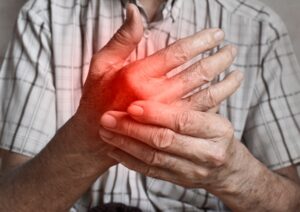As the temperatures rise and summer takes full effect, many people with arthritis may notice their symptoms changing. While cold weather is often associated with joint discomfort, heat and humidity can also exacerbate arthritis symptoms—leading to swelling, stiffness, and fatigue. One of the most effective yet overlooked ways to support joint health during the warmer months is by staying properly hydrated.
At Pacific Arthritis, our rheumatology specialists are committed to helping you stay comfortable and active year-round. In this blog, we’ll explore how summer heat affects arthritis, the importance of hydration, and provide practical tips for managing symptoms so you can enjoy a more pain-free season.
How Summer Heat Impacts Arthritis
While some people experience relief in warmer climates, others find that high temperatures and humidity intensify inflammation and joint pain. The summer months can affect arthritis symptoms in the following ways:
- Dehydration: Fluid loss due to sweating can cause joint cartilage to lose moisture, leading to increased stiffness and discomfort.
- Inflammation: Heat may increase systemic inflammation, especially in individuals with autoimmune forms of arthritis like rheumatoid arthritis (RA) or psoriatic arthritis (PsA).
- Swelling: Warm weather can cause blood vessels to dilate, leading to fluid retention and swollen joints, particularly in the hands and feet.
- Fatigue: Heat and flare-ups can combine to leave you feeling more tired, impacting your ability to stay active.
Understanding how your body responds to climate changes is essential to managing symptoms effectively—especially in summer.
The Role of Hydration in Joint Health
Water plays a crucial role in maintaining healthy joints. Synovial fluid, the lubricant that cushions your joints, is largely composed of water. When you’re dehydrated, this fluid becomes less effective, which can lead to increased friction, stiffness, and pain.
Benefits of staying well-hydrated include:
- Improved joint lubrication
- Reduced inflammation
- Enhanced circulation, delivering nutrients to joint tissues
- Support for kidney function, which helps eliminate uric acid in gout patients
Especially in the summer months, staying hydrated is a powerful tool for managing arthritis symptoms naturally.
Signs You May Be Dehydrated
Even mild dehydration can worsen arthritis symptoms. Watch for these common warning signs:
- Dry mouth or lips
- Headache
- Dizziness or lightheadedness
- Fatigue
- Dark yellow urine
- Muscle cramps or joint stiffness
If you notice these symptoms, increase your fluid intake and monitor how your joints respond.
Hydration Tips for Arthritis Patients
Proper hydration doesn’t have to be complicated. Here are some simple but effective ways to stay ahead of the heat and protect your joints:
1. Drink Water Consistently
Aim for at least 8–10 cups of water per day, and more if you’re active or spending time outdoors. Don’t wait until you’re thirsty—by then, you’re already mildly dehydrated.
2. Eat Water-Rich Foods
Incorporate hydrating foods into your diet such as:
- Cucumbers
- Watermelon
- Oranges
- Strawberries
- Leafy greens
These foods also contain anti-inflammatory nutrients that are beneficial for joint health.
3. Limit Dehydrating Beverages
Reduce consumption of alcohol, caffeine, and sugary sodas, as they can contribute to dehydration. Opt for herbal teas or electrolyte-infused water if you need variety.
4. Use a Reusable Water Bottle
Keep water within reach by carrying a refillable water bottle throughout the day. Set reminders to take sips every 30–60 minutes.
5. Monitor Urine Color
A light, pale yellow color indicates proper hydration. Darker urine is a sign that you need more fluids.
Additional Summer Tips for Managing Arthritis
Hydration is just one piece of the puzzle. Here are more ways to minimize flare-ups and discomfort during the summer:
Stay Cool
Avoid peak heat hours (usually between 11 AM and 3 PM) when going outside. Use air conditioning, fans, and cooling towels as needed.
Dress Comfortably
Wear lightweight, breathable clothing and supportive shoes to reduce stress on your joints and minimize swelling.
Modify Your Exercise Routine
Stick to low-impact exercises like swimming, water aerobics, or indoor stretching to stay active without overheating or aggravating your joints.
Practice Daily Joint Care
Use assistive devices if needed, and perform gentle stretching to maintain flexibility. For inflamed joints, alternate between cold and warm compresses to ease discomfort.
When to Seek Help
If your arthritis symptoms worsen during the summer despite taking precautions, it may be time to reassess your treatment plan. At Pacific Arthritis, we offer a range of advanced rheumatology services to help manage arthritis year-round, including:
- Infusion Therapy for inflammatory arthritis
- Ultrasound-Guided Injections for targeted joint relief
- Telemedicine Consultations for convenient access to care during your summer travels
Our team of rheumatologists is here to ensure that your treatment plan adapts to your lifestyle and environment.
Conclusion
Summer doesn’t have to mean suffering through painful flare-ups. With proper hydration, smart lifestyle choices, and expert support, you can keep joint discomfort in check and enjoy the season ahead.
At Pacific Arthritis, we provide compassionate, customized care to help patients with arthritis thrive in every season. If you’re looking for relief or want to explore new treatment options, we’re here to guide you every step of the way.
Call us at (310) 297-9221 to schedule a consultation. We proudly serve patients at our locations in Los Angeles and Santa Monica. Let’s keep your joints healthy, mobile, and pain-free this summer and beyond.



